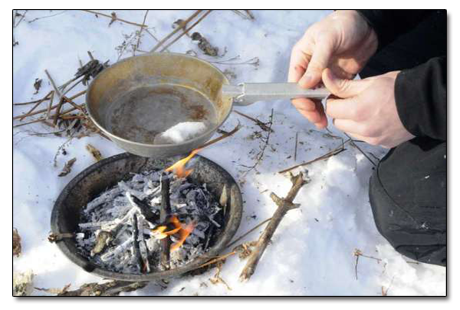You never want to take any chances when it comes to staying hydrated in a survival situation. Access to a steady and safe supply of water is more important than anything else other than breathing. While there are a lot of ways to extract water from our surroundings in a crisis, there are also a lot of myths that may lead to disappointing or even deadly results. Here are a few examples of things not to do if you’re on the hunt for water.
Yes, snow is frozen water, but it’s also full of air. In fact, most snowflakes only contain about 10% water. The rest of the snowflake is comprised of air and particles that it collected from the atmosphere. Consequently, you need to eat an awful lot of snow in order get a serving of water, and this can have serious consequences. You will end up packing a lot of that snow with your mouth before swallowing in order to avoid eating a lot of air. Combined with the volume of snow that you need to eat, temperatures in your digestive tract and core can drop, and this can lead to anything from frostbite of the mouth to hypothermia.
The best way to eat snow is to melt it first and drink the water. Try to let the water warm up before drinking as well, because this can help to warm you from the inside out.
Drinking Urine or Blood

There are a lot of mixed-feelings out there about the benefits of drinking urine. However, using it as a form of water should be avoided at all costs. The problem is that the water content in “recycled” urine will decrease as it evaporates or gets absorbed by the body. This increases the concentration of toxins and contaminants that the body is trying to expel. By re-introducing them into your system, you’re exposing yourself to a wide-range of ailments that can make problems worse.
The key is to never end up in a situation where this is your only option. Be prepared, know the conditions that you will encounter and know where you can go to find water if your supplies run out.
You should also avoid drinking blood unless it’s absolutely necessary. While the logic is that animal blood contains water, it’s also loaded with all kinds of microorganisms that our bodies are not prepared to deal with. The risk of contracting one of dozens of diseases or developing a serious infection far outweighs the benefits.
Sucking on a Stone

Another popular myth is that we can get hydrated from sucking on a stone. Saliva will form in our mouth, quench our thirst, and the spit we swallow can help to offset the effects of dehydration. Nothing could be further from the truth. We will actually lose water through spit as it gets absorbed by the stone, dribbles from the mouth or evaporates. We also end up ingesting whatever contaminants may be on the stone. There’s also the risk that we can accidentally swallow the stone as well. If you can find a stone, chances are that you can also find some grass, leaves or plants nearby that contain even a small amount of moisture.
Hopefully you will never be in a situation where you need to resort to these or other myths and drastic measures in order to stay hydrated, and that’s the point. Be prepared.
